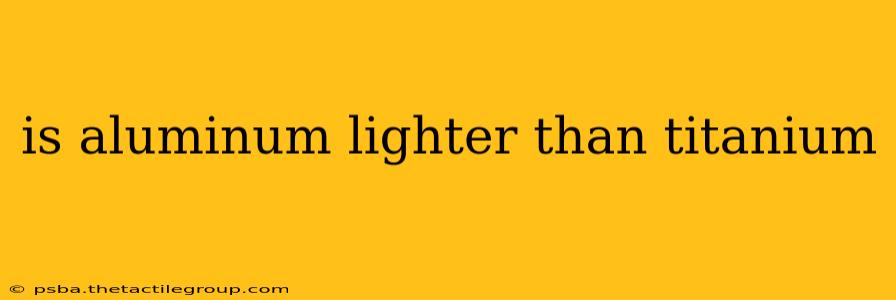Aluminum and titanium are both incredibly strong yet lightweight metals, frequently used in a wide array of applications from aerospace engineering to consumer products. But which one is lighter? The simple answer is yes, aluminum is lighter than titanium. However, a deeper dive reveals a more nuanced comparison.
Density: The Key Difference
The primary reason aluminum is lighter is its significantly lower density. Density measures the mass of a material per unit volume. Aluminum boasts a density of approximately 2.7 grams per cubic centimeter (g/cm³), while titanium's density is around 4.5 g/cm³. This means that for the same volume, titanium will weigh approximately 67% more than aluminum.
What Does This Mean in Practical Terms?
Imagine you have two identical-sized blocks, one made of aluminum and the other of titanium. The aluminum block will be considerably lighter. This difference in weight is crucial in applications where minimizing weight is paramount, such as:
- Aerospace: Aircraft and spacecraft designers constantly strive to reduce weight to improve fuel efficiency and performance. Aluminum's lightweight nature makes it a popular choice for aircraft components.
- Automotive: Lightweight vehicles are more fuel-efficient. Aluminum alloys are increasingly used in car bodies and parts to achieve this goal.
- Sporting Goods: From bicycles to golf clubs, lightweight materials are desirable for enhanced performance and maneuverability. Aluminum's lightweight properties contribute to the design of many sporting goods.
Strength and Other Properties: A More Complex Picture
While aluminum is lighter, it's important to note that titanium possesses superior strength and other desirable properties. Titanium boasts:
- Higher Tensile Strength: Titanium can withstand greater stress before breaking compared to aluminum. This makes it ideal for applications requiring exceptional strength and durability.
- Excellent Corrosion Resistance: Titanium is highly resistant to corrosion, making it suitable for use in harsh environments where aluminum might degrade.
- Biocompatibility: Titanium's biocompatibility makes it a preferred material for medical implants.
Choosing the Right Metal: It Depends on the Application
The choice between aluminum and titanium depends heavily on the specific application and the priorities of the designer. If minimizing weight is the primary concern, aluminum is the clear winner. However, if high strength, corrosion resistance, or biocompatibility are essential, titanium's superior properties may outweigh its higher weight.
Aluminum Alloys vs. Titanium Alloys: Adding to the Complexity
Both aluminum and titanium exist in various alloy forms, each with unique properties that can further affect their weight and performance characteristics. The specific alloy used can significantly influence the final weight and strength of the material. Therefore, it's crucial to consider the specific alloy when comparing aluminum and titanium for a given application.
Conclusion: Aluminum Takes the Lightweight Crown
In summary, aluminum is undeniably lighter than titanium. However, the choice between these two metals involves a careful consideration of various properties beyond just weight. Understanding the strengths and weaknesses of each material is crucial for making informed decisions in engineering and design.

